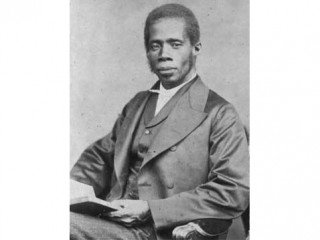
Edward Wilmot Blyden biography
Date of birth : 1832-08-03
Date of death : 1912-02-07
Birthplace : St. Thomas, Virgin Islands
Nationality : American
Category : Famous Figures
Last modified : 2011-03-11
Credited as : Writer and educator, diplomat and politician, pan-African journal
Edward Wilmot Blyden was a Liberian educator and statesman. More than any other figure, he laid the foundation of West African nationalism and of pan-Africanism.
Edward Blyden was born in St. Thomas, Virgin Islands, on Aug. 3, 1832, of free, literate parents. A precocious youth, he early decided to become a clergyman. He went to the United States in May 1850 and sought to enter a theological college but was turned down because of his race. In January 1851 he emigrated to Liberia, a African American colony which had become independent as a republic in 1847.
He continued his formal education at Alexander High School, Monrovia, whose principal he was appointed in 1858. In 1862 he was appointed professor of classics at the newly opened Liberia College, a position he held until 1871. Although Blyden was self-taught beyond high school, he became an able and versatile linguist, classicist, theologian, historian, and sociologist. From 1864 to 1866, in addition to his professorial duties, Blyden acted as secretary of state of Liberia.
From 1871 to 1873 Blyden lived in Freetown, Sierra Leone. There he edited Negro, the first explicitly pan-African journal in West Africa. He also led two important expeditions to Fouta Djallon in the interior. Between 1874 and 1885 Blyden was again based in Liberia, holding various high academic and governmental offices. In 1885 he was an unsuccessful candidate for the Liberian presidency.
After 1885 Blyden divided his time between Liberia and the British colonies of Sierra Leone and Lagos. He served Liberia again in the capacities of ambassador to Britain and France and as a professor and later president of Liberia College. In 1891 and 1894 he spent several months in Lagos and worked there in 1896-1897 as government agent for native affairs.
While in Lagos he wrote regularly for the Lagos Weekly Record, one of the earliest propagators of Nigerian and West African nationalism. In Freetown, Blyden helped to edit the Sierra Leone News, which he had assisted in founding in 1884 "to serve the interest of West Africa … and the race generally." He also had helped found and edit the Freetown West African Reporter (1874-1882), whose declared aim was to forge a bond of unity among English-speaking West Africans. Between 1901 and 1906 Blyden was director of Moslem education; he taught English and "Western subjects" to Moslem youths with the object of building a bridge of communication between the Moslem and Christian communities. He died in Freetown on Feb. 7, 1912.
Although Blyden held many important positions, it is more as a man of ideas than as a man of action that he is historically significant. He saw himself as a champion and defender of his race and in this role produced more than two dozen pamphlets and books, the most important of which are A Voice from Bleeding Africa (1856); Liberia's Offering (1862); The Negro in Ancient History (1869); The West African University (1872); From West Africa to Palestine (1873); Christianity, Islam and the Negro Race (1887), his major work; The Jewish Question (1898); West Africa before Europe (1905); and Africa Life and Customs (1908). His writings displayed conversancy with the main current of ideas as well as originality, and he was often controversial.
Blyden sought to prove that Africa and Africans have a worthy history and culture. He rejected the prevailing notion of the inferiority of the black man but accepted the view that each major race has a special contribution to make to world civilization. He argued that Christianity has had a demoralizing effect on blacks, while Islam has had a unifying and elevating influence.
Blyden's political goals were the establishment of a major modern West African state which would protect and promote the interests of peoples of African descent everywhere. He initially saw Liberia as the nucleus of such a state and sought to extend its influence and jurisdiction by encouraging selective "repatriation" from the Americas. He hoped, also in vain, that Liberia and adjacent Sierra Leone would unite as one nation. He was ambivalent about the establishment of European colonial rule; he thought that it would eventually result in modern independent nations in tropical Africa but was concerned about its damaging psychological impact. As a cultural nationalist, he pointed out that modernization was not incompatible with respect for African customs and institutions. He favored African names and dress and championed the establishment of educational and cultural institutions specifically designed to meet African needs and circumstances.
















